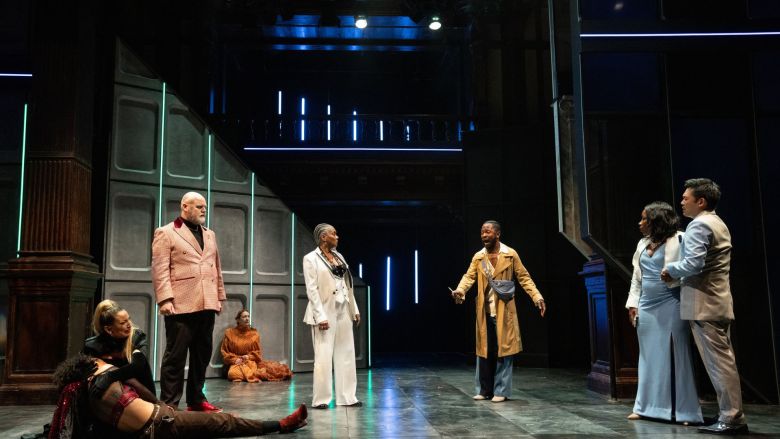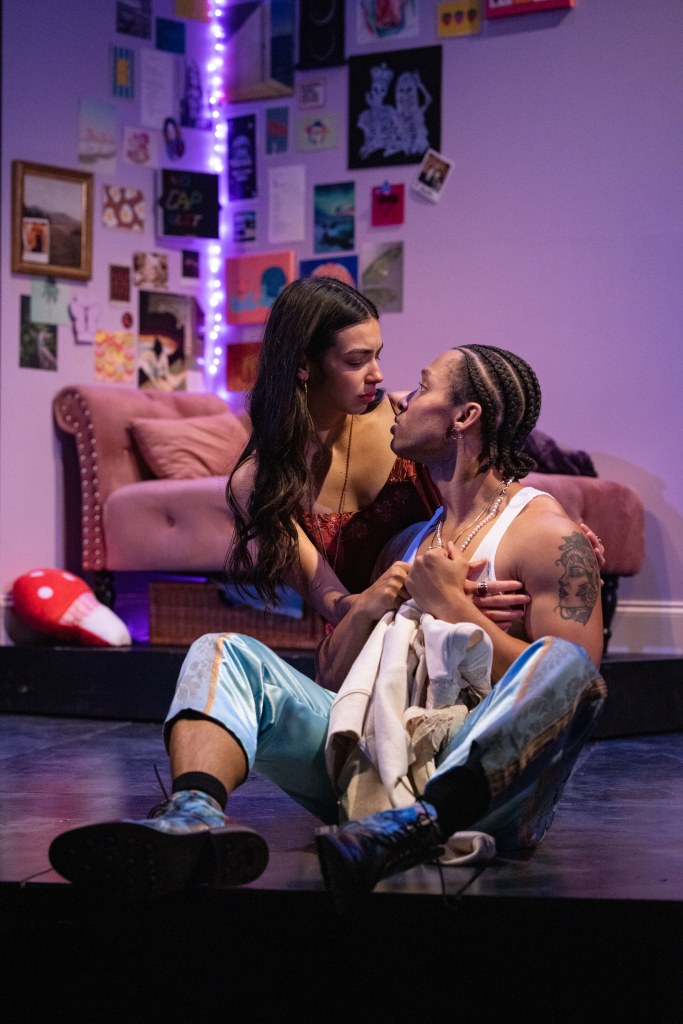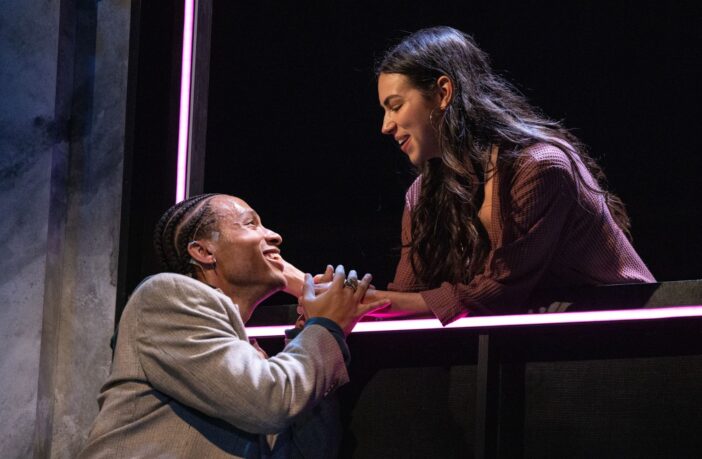By D. Kevin McNeir
Special to the AFRO
As students in America reach high school, where they anxiously look forward to getting their driver’s license, enjoying their first encounter with “true love,” even dreaming about moving on to college and, for the first time, being on their own, there’s another obstacle they must face before receiving their diploma: conquering the works of William Shakespeare.
Romeo (Cole Taylor) shares a tender moment with Juliet (Caro Reyes Rivera) during the famous balcony scene from William Shakespeare’s romantic tragedy. (Photo courtesy Folger Theatre)
Widely considered to be the preeminent dramatist and one of the most influential writers in the English language, Shakespeare, also known as “The Bard,” stands at the top of the Western canon of great literary figures.
But for many students, particularly those of color or those who come from schools that lack adequate financial and academic resources, Shakespeare looms like an evil specter – a ghostly figure with words they struggle to understand and with characters and storylines that bear little resemblance to the world in which they live.
However, the times, they are a-changin’. At least that’s the case in Washington, D.C., where the Folger Theatre, which is affiliated with Folger Shakespeare Library, is currently offering a jaw-dropping, fresh take on one of The Bard’s most beloved tragedies, “Romeo and Juliet.”
Raymond O. Caldwell, born in Germany to a Black man and German woman, and an accomplished, award-winning director and producer, makes his directorial debut at the Folger. And while remaining true to the text, Caldwell dismantles any preconceived notions one might have about Shakespeare and his love story of two teens which, because of political tribalism and their families’ thirst for influence and power, ends tragically.
As the curtain rises, the chorus, garbed in hooded black robes, takes center stage to speak the prologue, still delivered within the safe confines of the literary form familiar to Shakespeare and traditionally employed in 17th century poems of love – the Petrarchan sonnet. But that’s where the similarities end.
From then on, the director shocks our senses with a Romeo (Cole Taylor) and Juliet (Caro Reyes Rivera) that are both people of color; Juliet’s nurse who, like Juliet and her mother, speak both English and Spanish; and characters who indulge in the frequent, misguided use of both alcohol and cocaine.
The rear of the stage is dominated by screens which project images and words – exemplifying the dominance of social media and other modern technological advances, like Iphones, on society – which constantly juxtaposes with the rhythmic cadence of Shakespeare’s classical iambic pentameter. For example, some of the playwright’s most enduring lines are delivered as the characters live chat, post messages on their social media accounts and text one another – sometimes, while riding the District’s Red Line train on their way to “Verona.”
Perhaps these changes to the play are so easily embraced by the audience because they represent our reality – the world in which we live, work and play.
As for the actors, themselves, they further illustrate 21st century American society with a cast of Black, White, Asian and Hispanic thespians, interracial marriages and bilingual speakers. Some major characters, like Tybalt and Mercutio, are recast as women, straying from Shakespeare’s original version of the roles.
 Benvolio, center, (superbly portrayed by John Floyd), shares the tragic news (L-R) of Tybalt’s (Alina Collins Maldonado) death to the families of Romeo Montague and Juliet Capulet including Lady Capulet (Fran Tapia), Lord Capulet (Todd Scofield), Nurse (Luz Nicolas), Lady Montague (Renee Elizabeth Wilson) and Lord Montague (Tony Nam). (Photo courtesy Folger Theatre)
Benvolio, center, (superbly portrayed by John Floyd), shares the tragic news (L-R) of Tybalt’s (Alina Collins Maldonado) death to the families of Romeo Montague and Juliet Capulet including Lady Capulet (Fran Tapia), Lord Capulet (Todd Scofield), Nurse (Luz Nicolas), Lady Montague (Renee Elizabeth Wilson) and Lord Montague (Tony Nam). (Photo courtesy Folger Theatre)
On his website, Caldwell describes himself as one who’s “drawn to the grandiose and the grotesque, the transcendent and the trashy. My aesthetic often pays homage to drag, club-kid, queer, Black, Filipinx and pop culture.”
As for the staging of the play, Caldwell situates “Romeo and Juliet” in a fictitious world reminiscent of Washington, D.C., as he examines the violent consequences when systems like family, religion and government fail to protect and guide society’s youth.
“As the young lovers navigate their world of chaos and conflict, our version of the play challenges audiences to grapple with how wealth, class, substance abuse, mass media consumption, politics and tribalism shape our capacity for love and exacerbate violence,” Caldwell said in a statement.
Caldwell added that his reimagined “Romeo and Juliet” is part of a broader movement to make the arts more inclusive.
“Playwrights, designers, directors, universities and regional theaters are working together to redefine the theatre for the age we live in . . ., making theatre accessible to communities that long have been disenfranchised and are giving voice to stories that have long woven the American tapestry but who have gone unheard,” he said.
Karen Ann Daniels, the theater’s artistic director and director of programming for the Folger Shakespeare Library, said one of the reasons why “Romeo and Juliet” was chosen for the current season is because of its timeliness due to the election.
“Because we, as well as the Folger Shakespeare Library, are within close proximity to Congress, the Capital and the Library of Congress, that means we can have conversations about democracy in ways that others cannot,” she said. “We seek to pique one’s while never pressing visitors to our complex to choose sides.”
Daniels also said the classic play “has the widest appeal.”
“People seem to see themselves in the world of the play,” she added, although there is some disconnect.
“Shakespeare continues to be studied in schools and his works are even embedded in American culture – from cartoons to movies,” Daniels said. “However, one of the reasons why many youths and adults alike don’t understand Shakespeare is because of the way he’s presented – he’s not always friendly to younger or ethnically diverse communities and audiences.”

Part of the ethos of the Folger Shakespeare Library – and the theater by association – is making the famed playwright more accessible to modern-day audiences. And recent renovations to the Library, along with reimagined productions like “Romeo and Juliet” will, hopefully, draw morw people through the doors and advance their mission, Daniels added.
“This play has it all – its cast is multicultural, the show is done bilingually and there are mixed relationships, all of which serve as a metaverse of the world. We’ve had several groups of high school students from the area come see the show and among their comments, I’ve heard them say that with the use of social media infused in the production, it’s like watching a movie. As they go on to college, or out into the workforce, we hope they’ll understand that this institution is for them,” she said.
“This is the work we do: We present the plays of Shakespeare. But we do so because we want people to respond to him and his works while opening him up to people in ways that make them feel like they are not small but rather part of his world.”
For more information about “Romeo and Juliet” or to visit the newly renovated Folger Shakespeare Library, which anchors the world’s largest Shakespeare collection, visit www.folger.edu. “Romeo and Juliet” continues through Nov. 10 at the Folger Theatre.


